The report – Co-designing Metaverse Ethics: Perspectives of Jamaican Youth – emphasises the pivotal role that young people can, and should play in co-designing ethical guidelines for the Metaverse, and underscores their importance in defining what the digital future looks like. It also presents a set of recommendations to policymakers, researchers, investors and funders, and Metaverse providers and developers on the development of ethical digital spaces.
Project Amplify was an innovative education programme run in collaboration between Youth Can Do I.T. (YCDI) – a Jamaican youth empowerment organisation – and Jesus College. It aimed to empower young Jamaican students in the design and use of emerging digital environments, with a specific focus on the Metaverse. The project was funded through the College’s Development Fund, and led by researcher Dr Samantha-Kaye Johnston, Supernumerary Fellow in Education at Jesus, and YCDI colleagues Cherika Wilson and Christopher Derrell. Project Amplify was supported by programme facilitators from both Jamaica and Jesus, who were specially trained for the project. They also helped to shape the final report, including its accompanying ethical guidelines.
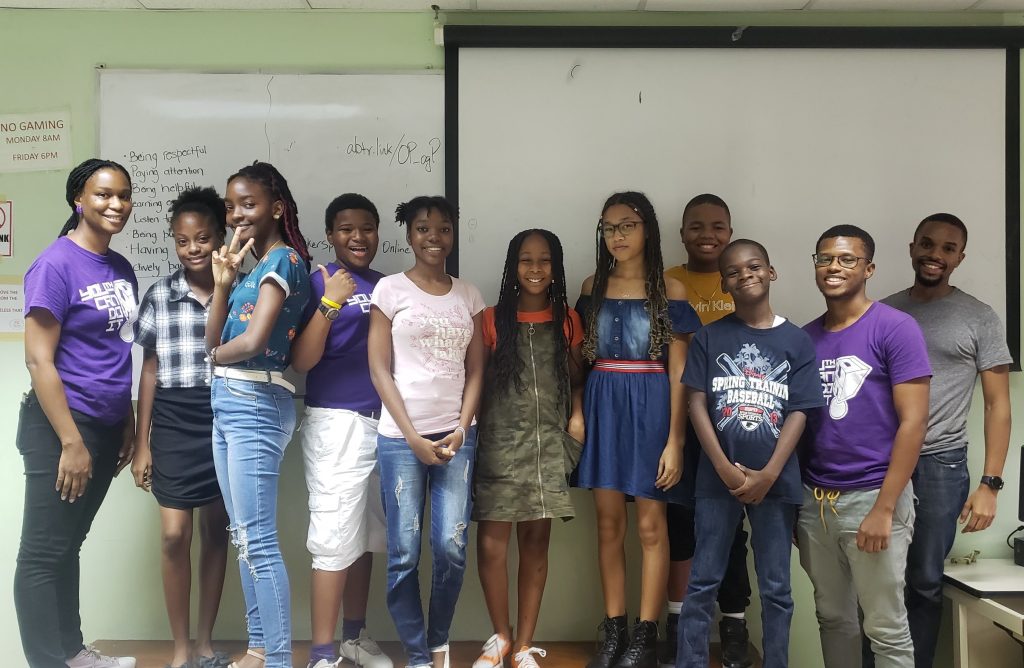
Participants and facilitators of the Project Amplify programme pictured on the final day on an In-person Amplify Camp.
While the Metaverse offers continuous and exciting new opportunities for young people to engage in creative play, and to learn and develop their thinking, there are also potential risks to their online safety, autonomy, information security, data privacy rights, and overall wellbeing. The Project Amplify team worked with twenty-five Jamaican schoolchildren over the course of a year to engage them in how the Metaverse operates, to develop the skills to design their own ethical Metaverse spaces, to listen and understand their concerns about interacting in virtual environments, and how these concerns could be ethically addressed.
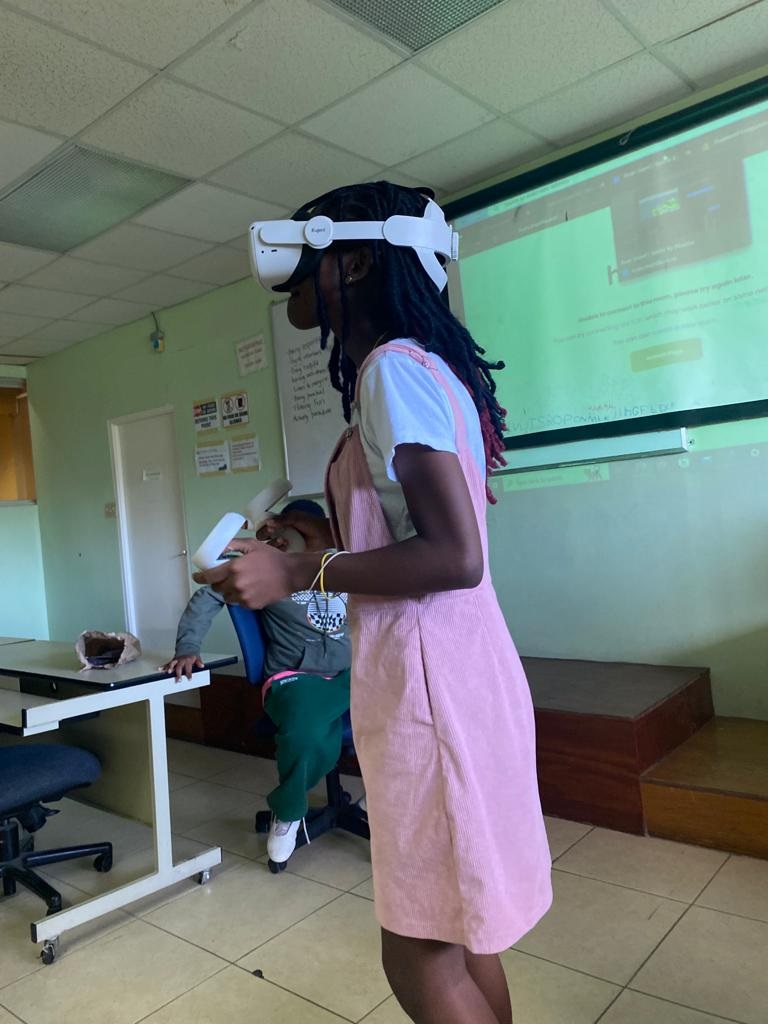
Amplify participant uses virtual headset.
Samantha explains: “It is vital that young people have the digital intelligence – the tools and awareness to engage in critical thinking, critical reading and critical creation in digital environments- to navigate the digital world safely. Through a series of guided sessions, we engaged with the children in ethical decision-making processes related to the Metaverse, and supported them to co-create a set of ethical guidelines to inform the development of the Metaverse.”
A small group of the participants also had the chance to visit Jesus earlier this year, and present their Metaverse designs to the College and wider UK community. They also visited the Jamaican High Commissioner to the United Kingdom, His Excellency Alexander Williams, in London.
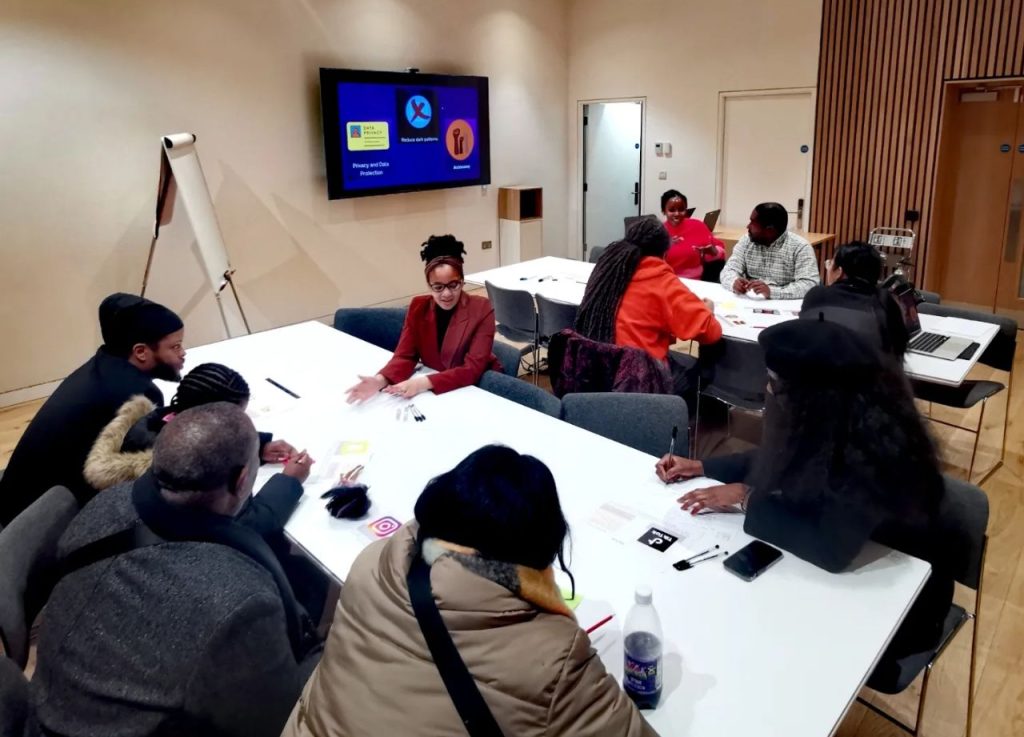
Dr. Samantha-Kaye Johnston, Amplify Coordinator, leads a breakout activity at Jesus College on the ethical guidelines
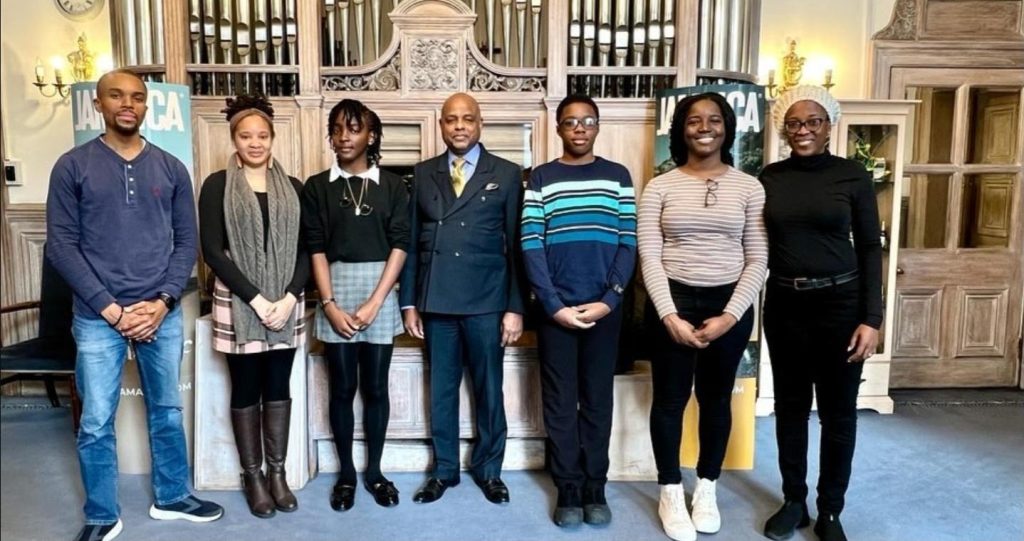
Project Amplify students visit the Jamaican High Commissioner to the United Kingdom, His Excellency Alexander Williams.
The final report sets out a series of key recommendations, developed by the project team, programme facilitators, and youth participants, for policymakers, investors and funders, Metaverse providers and developers, and researchers working in this field.
POLICYMAKERS
INVESTORS & FUNDERS
METAVERSE PROVIDERS & DEVELOPERS
RESEARCHERS
It’s hoped that the report’s findings and recommendations will now inspire further discussions on both co-designing with young people in long-term projects, and discussions that shape the ethical development of the Metaverse.
Samantha says, “This report shows that Jamaican youth are not only keeping pace with global technological developments but are leading the charge in shaping the ethics, and future of the Metaverse. It highlights the youth’s pioneering role in defining ethics for the Metaverse, using culturally resonant experiences that blends local identity with global significance.”
She adds, “I feel very proud of the young people who participated in Project Amplify. We had an entire year of learning with, and from them, and it was enlightening to see how the young people’s roles evolved throughout the course of the project. Leading Project Amplify over the past year was a challenging endeavour, but with the collaboration of Cherika Wilson and Christopher Derrell from YDCI (our partner organisation in Jamaica), the invaluable support of university-level facilitators from Jamaica and Jesus College, and expert trainers from around the world who delivered capacity-building sessions, we successfully engaged young people through interactive and impactful sessions. All of this was aimed at amplifying their voices in shaping the ethical design of the Metaverse.”
READ THE FULL REPORT HERE
READ THE ACCOMPANYING ETHICAL GUIDELINES HERE
Project Amplify is an innovative education programme that aims to empower young Jamaican students in the design and use of emerging digital environments, with a specific focus on the metaverse. The one-year project is a collaboration between Jamaican youth empowerment organisation Youth Can Do I.T. (YCDI) and Jesus College, and is being funded through the College’s Development Fund, which is generously supported by Jesus alumni. It launched in February 2023, and is led by researcher Dr Samantha-Kaye Johnston, Supernumerary Fellow in Education at Jesus, and YCDI colleagues Cherika Wilson and Christopher Derrell.
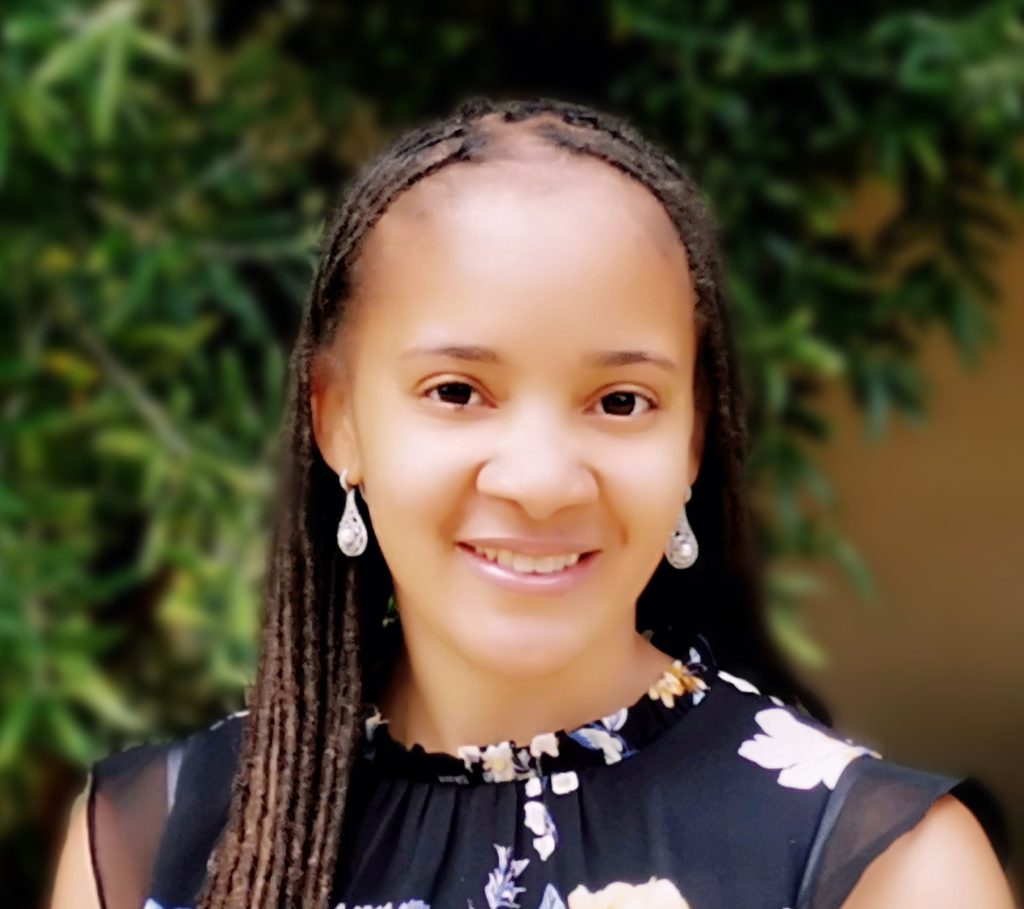
Dr Samantha-Kaye Johnston, Supernumerary Fellow in Education at Jesus College, Oxford.
The background to Project Amplify begins with the YCDI, which was founded in 2016 by Lianne McNaughton to support Jamaican children to develop their IT skillset and equip them with the tools to succeed in our rapidly-growing digital world. Through its educational programmes and experiences, YCDI has worked with over 2,500 school students across the country, giving them the skills and knowledge to become the next generation of content creators and change agents.
Most young people now have access to a wide range of digital devices, and the basic skills required to navigate their way around the internet and metaverse. Virtual environments and game spaces such as Roblox, Minecraft and Fortnite are used and enjoyed by millions of children worldwide, and the technologies on which such spaces are built are ever evolving.

However, while the metaverse offers continuous and exciting new opportunities for young people to engage in creative play, and to learn and develop, there are also potential risks; to their online safety, information security, data privacy rights, and overall wellbeing. This is where Samantha’s research comes in: she’s focused not only on enabling children to develop skills and knowledge in the digital space but also ensuring that their rights are protected while they interact within it. Samantha says, “My work includes looking at how people think, read and create in digital environments. I am particularly interested in elevating the voices of young people in decision-making processes, and making sure that they have the digital intelligence to safely navigate our digital world. In other words, ensuring that they’re equipped with the tools and awareness to engage in critical thinking, critical reading and critical creation in digital environments.”
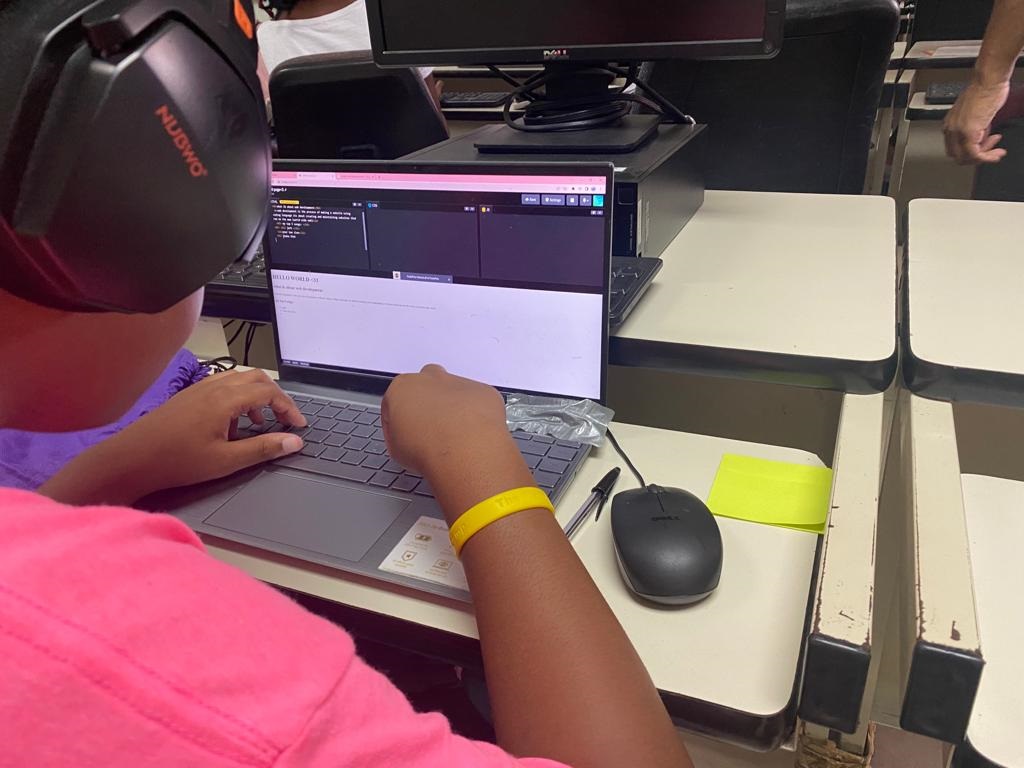
A Project Ampliify participant practises their digital skills during a web development session.
The YCDI’s Project Amplify places young people at the heart of this research. Working with 20 school students in Jamaican primary and high schools, Samantha and her YCDI colleagues have sought to understand their concerns regarding the metaverse, and how these concerns might be addressed.
The first phase of the programme focused on expert training for YCDI and Jesus College facilitators, and the second phase introduced the students to the facilitators, who together explored how the metaverse works. In both phases, training was delivered by leading researchers, designers and entrepreneurs from across different sectors, including Google, Harvard University, the University of Cambridge and Mighty Coconut. Chris explains, “Nowadays, young people are familiar with all kinds of digital technologies and how to use them, like gaming for example. However, they’re not necessarily aware of, or understand, their rights and the risks associated with interacting in such digital spaces. So our first action was to bring that to their awareness; to change their mindset in terms of what happens to their personal data when they’re interacting online, and how to interact safely and securely.” The students then spent time developing their digital skills, using YCDI’s own metaverse platform.
Phase 3 took the form of an in-person summer camp where students participated in a range of activities from creating their own webpages and metaverse spaces, to critically thinking about responsible and ethical use of these spaces. Their spaces were demonstrated to excited parents and guardians on the final day of the camp, as was their understanding of what constitutes ethical design. Cherika notes, “One interesting aspect of camp was seeing how the expectations for fair play and group engagement in the physical space translated into the ethical guidelines in the digital space, and how the participants were able to make the connection between the two.”
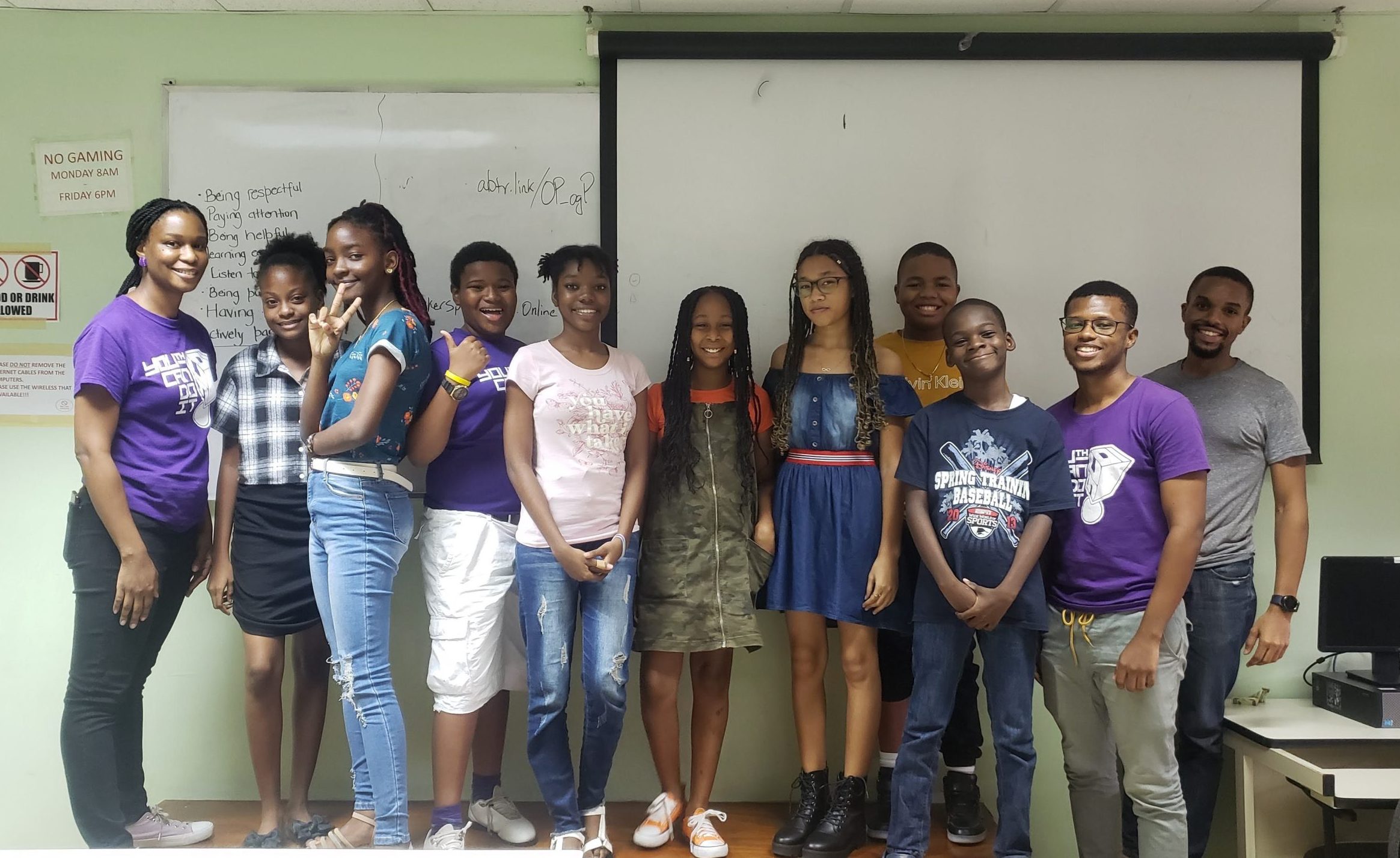
Project Amplify team members with school students at the recent summer camp.
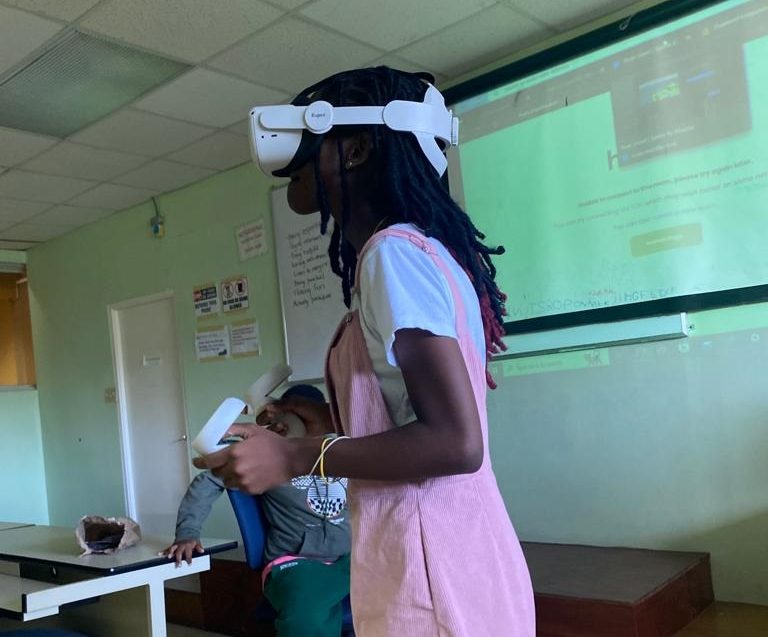
A summer camp participant tries out a virtual headset.
The end product will be a set of ethical guidelines for young people in the digital environment, which will form part of a final evaluation report on the project later this year. Samantha says, “Once the evaluation process is completed, we hope to share the findings of the report with the Jamaican government, and that the report might inform policy on the metaverse and education in Jamaica. For example, it could be possible to embed the topic into the school curriculum, so that all young people develop a basic understanding of how virtual environments are created, how this can be done safely and ethically, and then apply the knowledge they have gained to explore their digital skills and digital rights.”
“Our vision is that Project Amplify becomes a continuous programme for school students that can be facilitated regularly.”
In the meantime, the team are busy planning a visit to Oxford in Hilary 2024 by some of the students who have taken part in Project Amplify. The plan is to enable broader conversations around emerging themes from the project, and the visit will include a special event in the Cheng Kar Shun Digital Hub. Further plans are also being made for the students to engage in an invited visit to the Google Headquarters in London.
For more information on Project Amplify, visit the project website here.